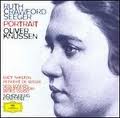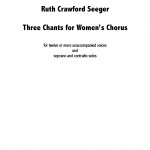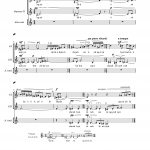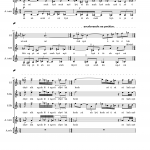Back in 1994, I was the soprano soloist at the Aldeburgh Festival in the premiere of an amazing, recently discovered piece called Three Chants by the experimental American composer, Ruth Crawford Seeger. At the time, I was completing my MMus at the Academy and looking for something to edit. The experience of performing Three Chants from a photocopy of the microfilm of the hand-written original manuscript found me that piece!
 It’s a piece for 12 female voices and soprano and alto solo and the original manuscript was difficult to read and involved far too many page turns, especially in the very quiet central movement. There were several important editorial decisions to make; particularly over the pronunciation of the phonemes that make up the ‘text’. The question of a performing edition became more pressing when Oliver Knussen decided to include Three Chants in his ‘Ruth Crawford Seeger: Portrait’ CD for Deutsche Grammophon.
It’s a piece for 12 female voices and soprano and alto solo and the original manuscript was difficult to read and involved far too many page turns, especially in the very quiet central movement. There were several important editorial decisions to make; particularly over the pronunciation of the phonemes that make up the ‘text’. The question of a performing edition became more pressing when Oliver Knussen decided to include Three Chants in his ‘Ruth Crawford Seeger: Portrait’ CD for Deutsche Grammophon.
Spurred on by the success of the piece and its impact in performance, it was almost published by Peters Edition. In the end, however, there were just too many legal obstacles and it never actually got published.
Recently, there’s been renewed interest in Three Chants, and, as I am the sole holder of the performing materials, I feel, since it’s just been International Women’s Day, I should do my bit for the piece, Ruth Crawford Seeger and women composers and make it more available to performers and a wider audience. I’ve just sent it to California. Wish me and it luck!



